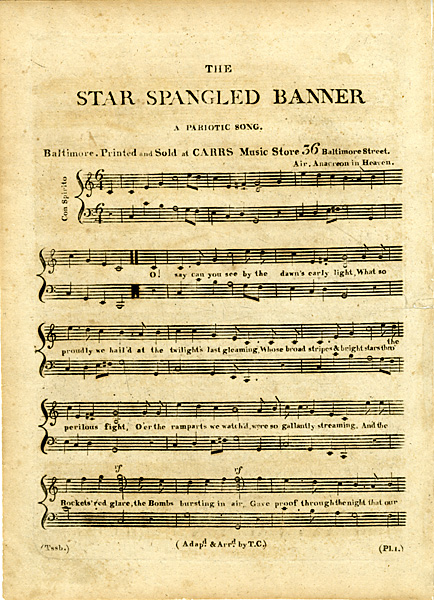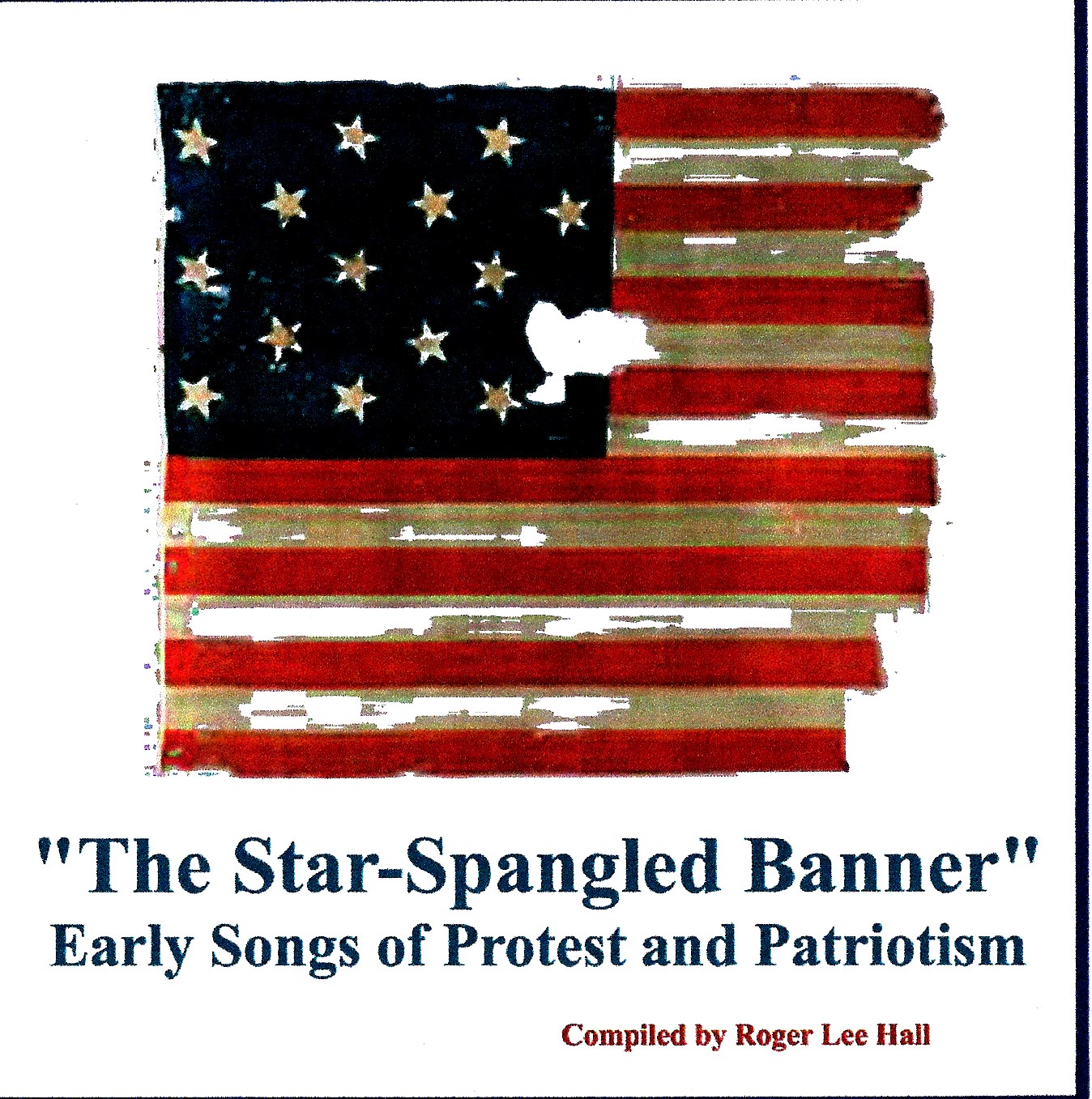
"The Star-Spangled Banner"
A Musical Salute
First page of the original 1814 published sheet music
adapted and arranged by Thomas Carr
note the misspelled subtitle: "A Pariotic [Patriotic] Song"
- Article: O Say, Can You Sing It?
- Multimedia disc: "The Star-Spangled Banner" - Early Songs of Protest and Patriotism
- Words: "Anacreontic Song" and "The Star-Spangled Banner"
- Related AMP links
O Say, Can You Sing It?
Sadly, there is a general ignorance about the history of the National Anthem among many of its citizens.
They don't appreciate the significance of this expression of the American spirit and that it was not meant to be sung like a pop song. A National Anthem should express dignity and pride and be performed with great respect.
Many people complain that it is too difficult to sing because it has a wide vocal range. Others complain about the singing of it by some pop, rock or other untrained singers who sometimes forget the words or can't stay on pitch with the tune. Both complaints are valid, especially the second one. It would be better to have the National Anthem sung at sporting and other events with a good trained singer instead of relying on a pop music star.
This year, being the bicentennial of "The Star-Spangled Banner," is the right time to help correct that situation with more attention paid to this anthem, not as the historic relic some think it is, but instead as a fervent patriotic expression and not the time to look bored until it is finished being sung and wait until the end before applauding at sporting events.

More emphasis needs to be made for this song. And that would include singing all four verses, not just the first one. If that proves unwise, then singing the first and fourth verses is a good alternative. For many years that was the way it was sung by the oldest surviving choral society in the USA - The Old Stoughton Musical Society. Their performance of a lively 19th century choral version of "The Star-Spangled Banner" is included on the music album listed below.
It is also worth mentioning that there were earlier poetic expressions during the War of 1812. One fervent anti-war poem titled, "Peace," written by a ten year old girl in Massachusetts, five months before the Francis Scott Key lyrics were written.
"The Star Spangled Banner" was popular during the 19th and early 20th centuries, mainly played by military bands.
It was not officially designated as the U.S. National Anthem until March 3, 1931, during the Great Depression, and signed into law by President Herbert Hoover.
The anthem was based on an English tune for the Anacreontic Society, composed by John Stafford Smith, with words by Ralph Tomlinson. Yes, it was written for a gentleman's society who liked to drink, but it was a very majestic tune and popular for that reason. Such songs of that era were often sung by men who had strong, lusty voices.
There were other patriotic songs considered for the National Anthem.Oscar G. Sonneck, writing back in 1909 in his exhaustive book titled: Report on "The Star-Spangled Banner," "Hail Columbia," "America" and "Yankee Doodle," wrote the following about the first printing:
The Baltimore American [newspaper], when publishing Key's poem on September 21, 1814, preceded by a brief historical note, did not print the title "The Star-Spangled Banner," but instead "Defence of Fort McHenry," did not mention Key by name at all, but added: "Tune: Anacreon in Heaven."
Sonneck also wrote:
In after years Key presented signed autograph copies to friends and others, but just how many such copies he made is not known.
The first reported singing of "The Star-Spangled Banner" in a public performance was by Mr. Hardinge at the Holiday Street Theatre in Baltimore on October 19, 1814.
Why was "The Star-Spangled Banner" chosen as the National Anthem in 1931?
One reason was it received much support from the American Legion and Veterans of Foreign Wars (or VFW).
The words are usually called just a poem but they are better termed as song lyrics written by Francis (known by friends and family as "Frank") Scott Key. He knew the song, "To Anacreon in Heaven," quite well so he was writing his words to a familiar tune.
The song lyrics expressed an important event in American history when this important question was asked about the 15 star flag used as a national symbol of pride,
O say does that star-spangled Banner yet wave,
O'er the land of the free and the home of the brave?
Since there are some who find it too difficult to sing, it might be best to not sing it unaccompanied but have a good singer and, if possible, some instrumental accompaniment.Ceremonial national anthems are often sung or played by trained musicians. So a trained solo singer or singers should sing it not amateur singers.
This is, after all, a symbol of the nation's survival during a wartime conflict and should still inspire us today.
So - let's hear it sung by a good trained singer or a chorus. As the last few lines say it so well...
"And the star-spangled banner in triumph shall wave,
O'er the land of the free and the home of the brave."--Roger Lee Hall
Director, American Music Recordings Archive (AMRA)
June 14, 2014 (Flag Day)
Sources for this article:
--Report on "The Star-Spangled Banner," "Hail Columbia." "America" and "Yankee Doodle," by Oscar George Theodore Sonneck, 1909 (Reprint, Dover Publications, 1972).
--Music for Patriots, Politicians, and Presidents: Harmonies and Discords of the First Hundred Years,
by Vera Brodsky Lawrence, MacMillan Publishing Co. Inc., 1975.
For the bicentennial of the U.S. National Anthem (1814-2014),
a multi-media disc has been prepared, with historical information and a selection of songs from the 18th and 19th centuries, including 12 Premiere Recordings. This disc is ideal for teaching or research.

How to order the CD
"The Star-Spangled Banner"
Early Songs of Protest and Patriotism
( AMRC 0045)
To order this limited edition CD order from the
American Music Recordings Collection (AMRC)

First verse of "Anacreontic Song"
tune by John Stafford Smith, published in 1779:To Anacreon in Heav'n, where he sat in full Glee,
A few Sons of Harmony sent a Petition,
That He their Inspirer and Patron would be;
when this Answer arriv'd from the JOLLY OLD GRECIAN
Voice, Fiddle and Flute,
no longer be mute,
I'll lead you my Name
and inspire you to boot,
And besides, I'll instruct you,
like me to intwine,
The Myrtle of Venus with Bacchus's Vine.-- words by Ralph Tomlinson


Portrait of Francis Scott Key (1779-1843)
Complete original song lyrics to "Defence of Fort McHenry"
(or "The Star Spangled Banner") - tune: "Anacreontic Song"O! say can you see by the dawn's early light,
What so proudly we hailed at the twilight's last gleaming,
Whose broad stripes and bright stars through the perilous fight,
O'er the ramparts we watched, were so gallantly streaming?
And the rockets' red glare, the bombs bursting in air,
Gave proof through the night that our flag was still there;
O say does that star-spangled Banner yet wave,
O'er the land of the free and the home of the brave?
On the shore dimly seen through the mists of the deep,
Where the foe's haughty host in dread silence reposes,
What is that which the breeze, o'er the towering steep,
As it fitfully blows, half conceals, half discloses?
Now it catches the gleam of the morning's first beam,
In full glory reflected now shines in the stream:
'Tis the star-spangled banner, O! long may it wave
O'er the land of the free and the home of the brave.
And where is that band who so vauntingly swore
That the havoc of war and the battle's confusion,
A home and a country, should leave us no more?
Their blood has washed out their foul footsteps pollution.
No refuge could save the hireling and slave
From the terror of flight, or the gloom of the grave:
And the star-spangled banner in triumph doth wave,
O'er the land of the free and the home of the brave.
O thus be it ever, when freemen shall stand
Between their loved home and the war's desolation.
Blest with vict'ry and peace, may the Heav'n rescued land
Praise the Power that hath made and preserved us a nation!
Then conquer we must, when our cause it is just,
And this be our motto: "In God is our Trust;"
And the star-spangled banner, in triumph shall wave,
O'er the land of the free and the home of the brave!
--Francis Scott Key, September 14, 1814
Related AMP links
American Music Recordings Archive (AMRA)
American Music Recordings Collection (AMRC)
For comments or questions, write to:
© 2014-2022 PineTree Productions. All Rights Reserved for content on this page. pinetreepro@aol.com







